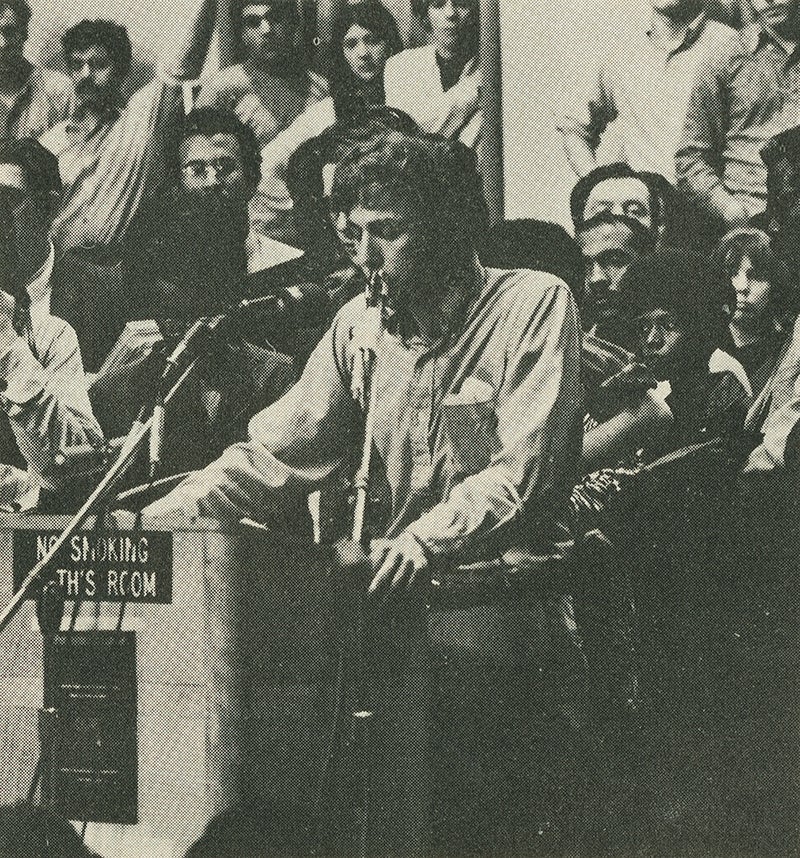Introduction
The sit-in that took place in College Hall over six days in February 1969 was later described by a Faculty Senate Advisory Committee member as “a strange war in which all sides won.” It started on February 18 as a greater Philadelphia area protest organized by the Students for a Democratic Society (SDS) against the University City Science Center (UCSC) over its displacement of residents as well as its Defense Department contract and secret research provisions. The initial protest included a march from campus to a vacant construction site at the UCSC and back, along with several speeches. However, after submitting seven “demands” to President Gaylord Harnwell in College Hall, the students decided to hold an unscheduled sit-in.
In general, the protestors’ demands called for the end of war-related research at the UCSC, student and community involvement in decisions related to Penn’s expansion, and University and UCSC commitment to providing public housing in University City. The sit-in, which would become Penn’s longest and largest to date, was orderly and peaceful and followed the Open Expression guidelines that had been drawn up the previous year by a University-wide commission. No offices were broken into, no buildings were closed, and no classes were disrupted. Negotiations took place over several days including at plenary sessions, at an unprecedented all-University faculty meeting, and with a small group of trustees who were already on campus for another meeting.
In the end, the sit-in was resolved on February 23 when the Executive Board of the Trustees approved the demonstrators’ proposal to establish a special commission to insure that University development would not conflict with community development. The Trustees’ statement read, in part:
The University has accepted the principle of community involvement by means of a quadripartite commission composed of community leaders, faculty, students and administration as a means of jointly advancing and coordinating community and University development and as a mechanism for securing community consent to development plans.
The Trustees declare a policy of accountability and responsibility that accepts the concerns and aspirations of the surrounding communities as its own concerns and aspirations and that to insure community of purpose in joint initiation, planning and execution of programs and effective mobilization of University talents and facilities, the quadripartite commision [sic] shall be the instrument through which these activities, at least initially, shall be carried out and that commission shall proceed to its work with the utmost urgency as set forth, in part, below.
The Trustees resolve that in order to proceed with immediate effectuation of this policy, that
- The quadripartite commission shall, at least initially, be composed of five community members designated by Renewal Housing, Inc., five University of Pennsylvania students designated by the community of demonstrators, five faculty designated by the University of Pennsylvania Faculty Senate, all but one of whom must be resident in West Philadelphia, and five Trustees or their representatives, and
- the quadripartite commission shall be empowered to review and approve all existing plans involving future land acquisition or development of currently owned land contiguous to existing residential neighborhoods, and shall be informed of the initiation of all such future plans and studies, and
- that the quadripartite commission shall operate on the principle that in all future University expansion which involves demolition of existing housing units, the University undertakes to guarantee the provision of an equivalent number of housing units at equitable prices and rentals, and
- that, in keeping with the principle of accountability and responsibility of the University to the surrounding community the members of the Board of Trustees individually and collectively agree to concert their efforts through the corporations, business, institutions and agencies to which they have access, to develop the funds and funding sources needed for community renewal programs with the goal of establishing a community development fund with resources of $10,000,000.
The sit-in ended before midnight on February 23; students swept and cleared trash from College Hall and flowers were sent to the Vice Provost’s secretarial staff. At an All-University Meeting on February 24, a resolution was adopted praising conduct during the sit-in and supporting the agreement made.
For a more detailed account of the events of the sit-in, see this article in the March 1969 issue of the Pennsylvania Gazette.

